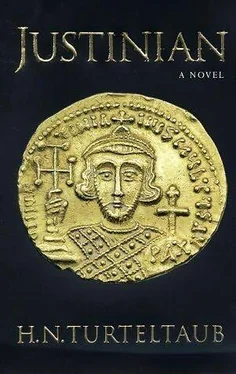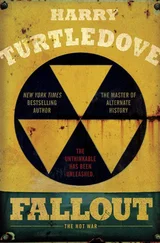Harry Turtledove - Justinian
Здесь есть возможность читать онлайн «Harry Turtledove - Justinian» весь текст электронной книги совершенно бесплатно (целиком полную версию без сокращений). В некоторых случаях можно слушать аудио, скачать через торрент в формате fb2 и присутствует краткое содержание. Жанр: Историческая проза, на английском языке. Описание произведения, (предисловие) а так же отзывы посетителей доступны на портале библиотеки ЛибКат.
- Название:Justinian
- Автор:
- Жанр:
- Год:неизвестен
- ISBN:нет данных
- Рейтинг книги:3 / 5. Голосов: 1
-
Избранное:Добавить в избранное
- Отзывы:
-
Ваша оценка:
- 60
- 1
- 2
- 3
- 4
- 5
Justinian: краткое содержание, описание и аннотация
Предлагаем к чтению аннотацию, описание, краткое содержание или предисловие (зависит от того, что написал сам автор книги «Justinian»). Если вы не нашли необходимую информацию о книге — напишите в комментариях, мы постараемся отыскать её.
Justinian — читать онлайн бесплатно полную книгу (весь текст) целиком
Ниже представлен текст книги, разбитый по страницам. Система сохранения места последней прочитанной страницы, позволяет с удобством читать онлайн бесплатно книгу «Justinian», без необходимости каждый раз заново искать на чём Вы остановились. Поставьте закладку, и сможете в любой момент перейти на страницу, на которой закончили чтение.
Интервал:
Закладка:
JUSTINIAN
The sum the Bulgars finally agreed to accept was twenty pounds of gold a year: fourteen hundred forty nomismata. They went back to Asparukh with the first year's installment in their saddlebags, and seemed happy enough to get it.
After they were gone from the capital- not before- I said, "That's not what I would have done, Father. I'd fight the barbarians and beat them once for all."
"When the Roman Empire is yours, you'll do as you judge best," he answered. "Now it is mine, and I reckon this course best. We have peace on all our borders, to give us time to recover from our wars, and we take in more than twice as much gold from the followers of the false prophet as we pay out to the Bulgars."
To my surprise, I found myself agreeing with Krobat, at whom I had scowled a few days before: I thought my father was running the Empire as if it were a fishmonger's shop, calculating every follis of profit and loss. But, as he had spoken, I dared not continue the argument, and while he lived we paid the Bulgars their tribute.
The sixth holy and ecumenical synod held its final session a few days before the fall equinox. By then the two hundred eighty-nine bishops, who had labored for ten months, were anxious to depart for their homes, especially those of them who had to travel by sea. My father and I presided together over that last session, which was held in the great church.
"By your acts," my father told the assembled bishops, holding up the copy of those acts to which they had affixed their names, some in the uncial script in which books are usually copied, some in the newer cursive, "by your acts, I say, you have restored peace to all us Christians. May that peace be deep and lasting."
He made the sign of the cross, as did many of the bishops who listened to him. During those last few years of his life, peace was very much on his mind, as if, having seen so much of war and strife in the earlier years of his reign, he wanted to avoid them at all costs thereafter. Understandable enough, I suppose, but not my way.
He went on, "By your acts, you have also rightly defined our holy Christian dogma for the rest of time. A thousand years from now, men may not remember your names- though some of you, surely, shall be among the saints- but, whenever they confess Christ's two natural wills and energies, they will remember what you have done here."
I had not thought of the synod's work in those terms, but no doubt he was right, just as today, no doubt, many confess that Christ and God the Father are of the same substance without ever thinking of St. Athanasios, who saved our holy church from the vile and infamous heresy of Areios.
It seemed also to have been a new thought to many of the bishops, but one of which they approved, not least because it magnified their importance in the scheme of things. Bishop Arculf of Rhemoulakion, for instance, paused long enough in eating whatever he was eating on that particular day to clap both hands together. Arculf did not return to the synod I summoned ten years later to decide questions of canon law left behind by the fifth and sixth ecumenical synods. I sometimes wondered if he safely reached his home in distant Gaul. Later, to my surpise, I learned.
George the ecumenical patriarch blessed the assembled bishops and thanked them for giving of their piety and wisdom for the benefit of all Christians throughout the inhabited world. The bishops bowed to him and then filed out of the church of the Holy Wisdom for the last time. The world will not soon see such a gathering of great theologians again.
MYAKES
Aye, Brother Elpidios, Justinian was pious. No one, not even his enemies- of whom he had a great whacking host- would have denied that. But I don't think it's from piety alone that he has such fond memories of the ecumenical synod. That was the time, that was the place, when he first started doing things on his own. He found out he could, and he liked the feeling.
Me? Yes, I think the bishops were a good and pious bunch. They started only a couple of tavern brawls I know of, and over the space of most of a year that's pretty fine, don't you think? And only one woman I heard about claimed a bishop got her with child, and not everyone believed her.
You say your standards are higher, Brother? Well, you have to remember, you're a holy monk, and I was just an excubitor. In those days, I started tavern brawls aplenty, and if no pretty girl said I put a loaf in her oven, it wasn't for lack of trying. Yes, I was a sinner. And Constantinople was a good town for a young man- oh, all right, for a sinner- to be alive in, too, that it was.
What's that? You never saw the place? You never saw Constantinople? Well, yes, now that I recall, you have said you were born in the provinces, and of course you've been here since you were young. But you've missed something mighty fine, that you have. There's not another place like the Queen of Cities in the whole wide world, not half there isn't. Damascus? Damascus can't hold a candle to it. Thessalonike? Thessalonike's not a bad town; I was there with Justinian. He'll talk about that later on, I expect. But Thessalonike is a town. Constantinople's a city- it's the city. They don't call it that for nothing, you know.
How is it different? Well, just for starters, it's got more people in it than you can shake a stick at. You'll never in all your days see so many people all in one place. You'll never in all your days smell so many people all in one place, either. It's a strong odor, but it's not always a nasty one. And in Constantinople, there always seemed to be a hint of spices and perfume to it- it's not just ordure and folks who've gone too long between baths. Ah, maybe that's an old man's memory playing tricks on him, but maybe it's not, too.
But where else could you walk down the street and see good old ordinary Romans and blond Slavs and Arabs in robes and Persians in hats that look like chamber pots and Lombard merchants with greasy hair and folk from who knows where bumping elbows with one another and not even hardly noticing they were doing it? You ever notice how, when a stranger comes into a village or a little town, everybody gives him the once-over, even if he's a Roman like everybody else? It's not like that there. There's too many people for them to keep track of who belongs and who doesn't, so they treat everybody like he belongs. Takes some getting used to, I know, but it's true. And they'll swindle their fellow townsmen just as happily as they will a stranger, too. Oh, aye, indeed they will. They'll steal the tunic off your back and sell it to you before you notice how you got to be naked.
But you can get anything you want there. Anything at all, I think. If you can find it anywhere in the world, you can find it in Constantinople. That means churches, too, mind you, Brother Elpidios. When you think of Constantinople, you think of the church of the Holy Wisdom, of course, and maybe the church of the Holy Apostles, too, where they bury the Emperors and their kin- you'll hear about that in due course. But those are only the big ones. They've got other fancy ones dedicated to the Virgin and John the Baptist and Saints Sergios and Bacchus and\a160… I could go on for a while, but you get the idea. And they've got little tiny churches that maybe only a dozen people can crowd into at a time, some of them dedicated to saints nobody three blocks away ever heard of. Something for everybody, like I say.
Even leaving the palaces out of the bargain, you've never seen the like of some of the houses there. They don't build 'em like that out in the country, let me tell you. I grew up in a shack made of mud bricks; my old man had to shore it up after every big rainstorm. Not like that in the city, no sir. The fancy brickwork the rich folks have on their houses- Lord! Baked bricks, one and all, and not just baked bricks, but bricks baked in different colors to make pictures or designs. Makes me shudder to think what work like that must cost, so it does.
Читать дальшеИнтервал:
Закладка:
Похожие книги на «Justinian»
Представляем Вашему вниманию похожие книги на «Justinian» списком для выбора. Мы отобрали схожую по названию и смыслу литературу в надежде предоставить читателям больше вариантов отыскать новые, интересные, ещё непрочитанные произведения.
Обсуждение, отзывы о книге «Justinian» и просто собственные мнения читателей. Оставьте ваши комментарии, напишите, что Вы думаете о произведении, его смысле или главных героях. Укажите что конкретно понравилось, а что нет, и почему Вы так считаете.












